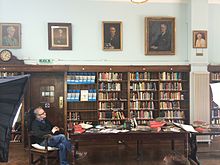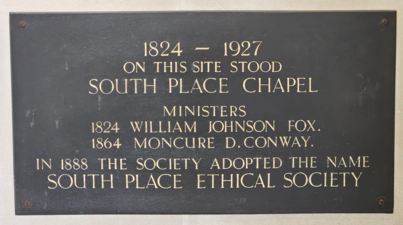Conway Hall Ethical Society
| Formation | 1787 |
|---|---|
| Founders | Elhanan Winchester (The Philadelphian congregation), William Johnson Fox (South Place Chapel), Stanton Coit (Ethical Society) |
| Type | Educational Charity |
| Registration no. | 1156033 |
| Focus | The advancement of study, research and education in humanist ethical principles. |
| Headquarters | London WC1R 4RL |
| Location |
|
| Coordinates | 51°31′11″N 0°07′06″W / 51.519722°N 0.118333°W, |
| Origins | South Place Chapel |
Area served | England & Wales |
| Owner | Conway Hall Ethical Society |
Revenue (2022) | |
Employees | 20 |
Volunteers | 1 |
| Website | https://www.conwayhall.org.uk/ |
Formerly called | South Place Ethical Society, South Place Institute, South Place Chapel |
| Conway Hall | |
|---|---|
GBP £28,485 (1928) | |
| Owner | Conway Hall Ethical Society |
| Design and construction | |
| Architect(s) | Frederick Herbert Mansford |
| Main contractor | John Greenwood Ltd |
| Website | |
| Official website | |
| References | |
| Conway Hall History | |
The Conway Hall Ethical Society, formerly the South Place Ethical Society, based in London at Conway Hall, is thought to be the oldest surviving
History
The Society's origins trace back to 1787, as a
William Johnson Fox became minister of the congregation in 1817. By 1821 Fox's congregation had decided to build a new place of worship, and issued a call for "subscriptions for a new Unitarian chapel, South Place, Finsbury".
-
Postcard of South Place Chapel
-
Front of interior of South Place Chapel.
-
Rear of interior of South Place Chapel.
-
Commemorative plaque describing the South Place Chapel.
Subscribers (donors) included businessman and patron of the arts Elhanan Bicknell.[4] In 1824 the congregation built a chapel at South Place, in the Finsbury district of central London.[5] The chapel was repaired by John Wallen, of a family of London architects and builders. This chapel later became the home of South Place Ethical Society. The chapel stood on the site of what is now the office building known as 8 Finsbury Circus; the building has an entrance in South Place which bears a plaque commemorating the chapel.
In 1929 they built new premises, Conway Hall, at 37 (now numbered 25)
The original name, South Place Ethical Society, was retained until 2012, when it changed to Conway Hall Ethical Society. In November 2013 Elizabeth Lutgendorff was elected Chair of the Conway Hall General Committee, becoming the youngest Chair in the society's history. On 1 August 2014 the society became a
Conway Hall
Conway Hall was designed by Frederick Mansford, being built on an L-shaped strip of land which the Society had acquired between
The main auditorium can hold 300 plus 180 in a gallery, and in recent years has been used as a corporate events space for conferences and product launches. The use of wooden panelling nailed directly to the brickwork and of acoustic plaster gives the hall excellent acoustic qualities; this makes it very suitable for the performance of music, and there have been regular recordings and concerts there. The ceiling of the auditorium was glazed, and this made it very light and airy for the time. It opened in 1929 and has continued in use since.[10]
Above the
Film location
The hall has been used as a location for various film and television productions. The building has appeared in
Humanist ceremonies
In 1935 twenty members of the Society signed a document stating that Conway Hall was their regular
Sunday Concerts
The Sunday Concerts at Conway Hall can be traced back to 1878 when the Peoples Concert Society was formed for the purpose of "increasing the popularity of good music by means of cheap concerts". Many of these concerts were held at the South Place Institute, but in 1887 the Peoples Concert Society had to cut short its season through lack of funds. At that point the South Place Ethical Society undertook the task of organising concerts under the first Honorary Secretary Alfred J. Clements and Assistant Secretary George Hutchinson who continued to run them under the name 'South Place Sunday Concerts'.[11] The thousandth concert was played on 20 February 1927,[12] and the two-thousandth concert was held at the Queen Elizabeth Hall on 9 March 1969.[13] Clements was the Honorary Secretary for over 50 years, from 1887 to 1938. The Clements Memorial Prize for chamber music was set up in his name in 1938. Composer Richard Henry Walthew also had a long association with the Sunday Concerts, from the early 1900s until his death in 1951.
The concert series provided a rare platform for the work of women composers during its first few decades. The programming included a still small, but significant number of compositions by women compared to other concerts in London. Women composers featured in the first 1,000 concerts included Alice Verne-Bredt, sisters Amy, Annie and Jessie Grimson, Liza Lehmann, Ethel Smyth, Edith Swepstone, Josephine Troup and Maude Valérie White.[14][15]
In 1929 the South Place Ethical Society had the Conway Hall purpose built for it, and with the exception of the war years the concert seasons have continued. The concerts have now been organised by the Artistic Director, Simon Callaghan.
Hawkins Catalogue
Frank A. Hawkins served as Treasurer of the Sunday Concerts for 24 years from 1905 until his death in June 1929. He collected nearly 2,000 pieces of sheet music of principally classical and romantic chamber music, which were bequeathed to the Society. The collection has been catalogued by composer and instrument combination and is held on the Conway Hall premises.[16]
Conway Memorial Lecture
The Conway Memorial Lecture was inaugurated by the Society in 1910 to honour Moncure Conway who died in 1907. The decision to create the Lecture was made in 1908 and the first Lecture, The Task of Rationalism, was given by John Russell and is presumed to have been chaired by Edward Clodd.
Prominent lecturers have included
No Lectures took place in 1958, 1959, 1961, 1962, 1963, 1964, 1965, or 1966.[17]
The 2014 Conway Memorial Lecture was given by Professor Lisa Jardine on 26 June 2014. It was titled "Things I Never Knew About My Father"[18] and detailed the MI5 files kept on her father, Jacob Bronowski, who sixty years earlier had delivered that year's Conway Memorial Lecture.
Library

The Humanist Library and Archives based at Conway Hall is the UK's foremost resource of its kind in Europe and the only library in the UK solely dedicated to the collection of Humanist material.[19]
Prominent members (past and present)
- A. E. Heath
- Annie Besant
- Harold Blackham
- Fenner Brockway
- C. Delisle Burns
- Herbert Burrows
- Peter Cadogan
- Alfred J. Clements
- Stanton Coit
- Moncure Conway
- Andrew Copson
- George Hutchinson
- Naomi Lewis
- Elizabeth Lutgendorff
- James O'Malley
- Samuel Kerkham Ratcliffe, regular lecturer 1910s–1930s
- J. M. Robertson
- Sid Rodrigues
- Donald Rooum
- John Saunders
- Athene Seyler
- Barbara Smoker
- Harry Snell
- Reginald Sorensen
- Dr Harry Stopes-Roe
- Nicolas Walter
- Richard Henry Walthew
- Elhanan Winchester
Other notable people associated with the Society
- Charles Bradlaugh, founder of the National Secular Society, and his daughter Hypatia Bradlaugh Bonner
- Sophia Dobson Collet, who contributed hymns;[20] her brothers Charles, the Society's musical director, and Collet Dobson Collet
- Eliza Flower[21] and her sister Sarah Fuller Flower Adams, who contributed hymns[22]
- Peter Fribbins, C20 director of Sunday concerts formerly held at Conway Hall
- Philip Harwood, assistant minister to Fox in 1841
- Gerald Heard, lecturer from 1927
- James Hemming, in whose name the Society administers an annual prize since 2009
- Laurence Housman, C20 pacifist and socialist
- Harriet Law, C19 freethinker
- Harry Price, C20 psychic researcher, born on the site
- John Pye-Smith, C19 theologian, tutor to Fox
- Purcell Schoolat the Hall in 1962
- Archibald Robertson, popular lecturer 1945–60[23]
- Samuel Sharpe, who joined South Place Chapel in 1821
- Timothy West, C20 actor[24]
- Anna Wheeler, 1820s speaker on women's rights
Journal

The journal of the society, which records its proceedings, is the Ethical Record. The issue shown for December 2012 was volume 117, number 11. This edition outlines the procedure that took place for the historic change of name the previous month.
Sunday Assembly
Since 2014, Conway Hall has been host to the Sunday Assembly, a popular secular service which takes place on the first and third Sunday of every month.[25]
See also
- Humanists UK
- Ethical Movement
- International Humanist and Ethical Union
- National Secular Society
- Rationalist Association
References
- ^ "Charity Details". beta.charitycommission.gov.uk.
- ^ "A short history of Conway Hall Ethical Society". Conway Hall. 11 September 2017. Retrieved 11 March 2019.
- ^ Conway, Moncure (April 1895). "Two historical South Place editors" (PDF). South Place Magazine. 1 (1): 1. Retrieved 2 January 2016.
- ^ "The building of South Place Chapel, 1821 - Conway Hall". Conway Hall. 21 November 2013. Archived from the original on 2 August 2018. Retrieved 2 August 2018.
- ISBN 9781898723707
- ^ Colin Campbell. 1971. Towards a Sociology of Irreligion. London: MacMillan Press.
- ^ "British Listed Buildings". www.britishlistedbuildings.co.uk.
- ^ Historic England. "CONWAY HALL (1392343)". National Heritage List for England. Retrieved 7 February 2014.
- ^ ISBN 9780521266727. Retrieved 13 May 2014 – via books.google.com.
- ISBN 9780521266727
- ^ Cole, Hugo (12 March 1987). "Passionately Progressive". Country Life.
- ^ Meadmore, W.S. (1927). The Story of a Thousand Concerts (1887-1927). London: South Place Ethical Society. p. 5.
- ^ Hawkins, Frank V. (1969). The Story of 2000 Concerts. London: South Place Ethical Society. p. 42.
- ^ The women musicians of Conway Hall’s past Conwayhall.org
- ^ Jessica Claire Beck. The Women Musicians of South Place Ethical Society, 1887 – 1927, Manchester Metropolitan University thesis (2018) via 1library.net
- ^ Conway Hall. South Place Sunday Concerts history and archive conwayhall.org.uk
- ^ "Conway Memorial Lectures Archive - Conway Hall". Conway Hall. Archived from the original on 16 December 2014. Retrieved 27 June 2014.
- ^ Things I Never Knew About My Father Archived 16 December 2014 at the Wayback Machine, Conway Hall
- ^ Conway Hall website: http://conwayhall.org.uk/our-library Archived 25 May 2014 at the Wayback Machine [Accessed 13 May 2014]
- ISBN 0-7190-0557-4.
- ^ Conway, Moncure (1904). Autobiography: Memories and Experiences of Moncure Daniel Conway (v. 2). London: Cassell and Company, Limited. p. 39.
- ^ American Unitarian Association 1922, p. 1094.
- ISBN 9780521266727.
- ^ "Our Patrons". Conway Hall. Conway Hall Ethical Society. Retrieved 18 February 2019.
- ^ "SA London – The London congregation of the Sunday Assembly". london.sundayassembly.com.
Sources
 This article incorporates text from this source, which is in the public domain: American Unitarian Association (1922). Christian Register (Public domain ed.). American Unitarian Association – via books.google.com.
This article incorporates text from this source, which is in the public domain: American Unitarian Association (1922). Christian Register (Public domain ed.). American Unitarian Association – via books.google.com.- Conway, Moncure Daniel. Centenary History of the South Place Society: based on four discourses given in the chapel in May and June, 1893. London/Edinburgh: Williams and Norgate, 1894
- MacKillop, Ian (1986). The British Ethical Societies. Cambridge: Cambridge University Press. ISBN 0-521-26672-6
External links
![]() Media related to Conway Hall at Wikimedia Commons
Media related to Conway Hall at Wikimedia Commons




